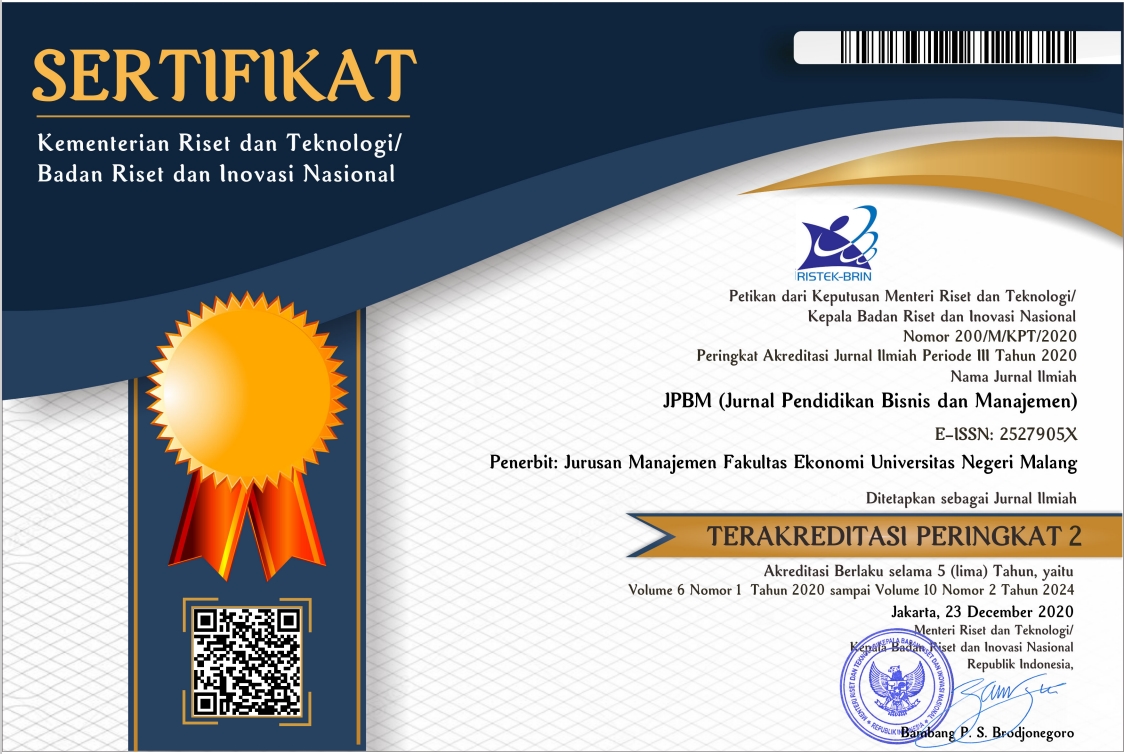Effect of Knowledge Transfer on Economic Sustainability With Network Strength as Moderating
Abstract
This study aims to examine the effect of knowledge transfer on sustainability in the agricultural sector in Boyolali district and examine the effect of network strength as a moderating variable in the influence of knowledge transfer on economic sustainability. The data were conducted through a survey using a questionnaire with purposive sampling to 119 heads of farmer group cooperatives in Boyolali district, with a questionnaire level of 98 percent. This study applied a hierarchcal regression to test the research model used. The results show that knowledge transfer has significant influence on economic sustainability in the agricultural sector. Finding knowledge in the context of the agricultural sector in Boyolali district has a relationship that is not in line with economic sustainability. While knowledge sharing carried out positively affects on economic sustainability. The power of knowledge sharing in influencing sustainability is largely determined by the strength of the network they have.
Keywords
Full Text:
PDFReferences
Boone, T., & Ganeshan, R. 2008. Knowledge Acquisition and Transfer Among Engineers: Effects of Network Structure. Managerial and Decision Economics, 29, 459–468
Davenport, T. H. & Prusak, L. 2000. Working Knowledge: How Organizations Manage What They Know. Havard Business School Press: Boston Massachusetts.
Hansen, M.T. 1999. The Search-Transfer Problem: The Role of Weak Ties in Sharing Knowledge Across Organization Subunits. Administrative Science Quarterly, 44(1), 82–111
Jorna, R. 2006. Sustainable Innovation. Greenleaf Publishing Ltd: United Kingdom.
Kang, M., & Young, G. 2009. A Multilevel View on Interpersonal Knowledge Transfer. Journal of the American Society for Information Science and Technology, 61(3), 483–494.
Kim, I., & Hae, L. S. 2007. Depreciation and Transfer of Knowledge: an Empirical Exploration of a Shipbuilding Process. International Journal of Production Research, 47(7), 1857–1876.
Lapre, M. A., & Luk, N. V. W. 2001. Creating and Transferring Knowledge for Productivity Improvement in Factories. Management Science, 47(10).
Lee, R. P., Daekwan, K. O. C., & Jean L. J. 2008. Knowledge Transfer Between Multinational Corporations’ Headquarters and Their Subsidiaries : Influences on and Implications for New Product Outcomes. Journal of International Marketing, 16(2).
Lin, H. F. 2007. Knowledge Sharing and Firm Innovation Capability : an Empirical Study. International Journal of Manpower, 28(3/4), 315-332
Nonaka, I., Takaeuchi, H. 1995. The Knowledge-Creating Company. Oxford University Press: New York
Rao, N. H., & Rogers, P.P. 2006. Assessment of Agricultural Sustainability. Current Science, 91(4).
Reagans, R., & Bill, M. 2003. Network Structure and Knowledge Transfer: The Effects of Cohesion and Range. Administrative Science Quarterly, 48(2), 240–267.
Rodgers, W., & Solomon, N. 2007. The Effects of Web-Based Technologies on Knowledge Transfer. Communications of The Acm. July 2007/vol. 50, no. 7
Rothwell, J. D. 2010. In the Company of Others : an Introduction to Communication. 3rd Edition, New York, NY; Oxford University Press, 11-15
Sabherwal, R., & Sanjiv, S. 2005. Knowledge Management Using Information Technology: Determinants of Short-Term Impact on Firm Value. Decision Sciences, 36(4), 531–567.
Slaughter, S. A., & Laurie J. K. 2006. The Effectiveness of Knowledge Transfer Portfolios in Software Process Improvement: A Field Study. Information Systems Research,17(3), 301–320.
Smyth, A. J., & Dumanski, J. 1993. FESLM: an international framework for evaluating sustainable land management. World Soil Resources Report No. 73. Rome: FAO.
Smith, C. S., & McDonald, G. T. 1998. Assessing the Sustainability of Agriculture at the Planning Stage. Journal of Environmental Management, 52, 15–37
Tsai, W. 2001. Knowledge Transfer in Intraorganizational Networks: Effects of Network Position and Absorptive Capacity on Business unit Innovation and Performance. Academy of Management Journal, 44(5), 996-1004.
Uzzi, B. 1997. Social Structure and Competition in Interfirm Networks: The Paradox of Embeddedness. Administrative Science Quarterly, 42(1), 35–67.
DOI: http://dx.doi.org/10.17977/um003v4i12018p010
Refbacks
- There are currently no refbacks.
JPBM (Jurnal Pendidikan dan Bisnis Manajemen) is licensed under a Creative Commons Attribution-NonCommercial-ShareAlike 4.0 International License.
JPBM (Jurnal Pendidikan dan Bisnis Manajemen) is abstracted and indexed in :
















